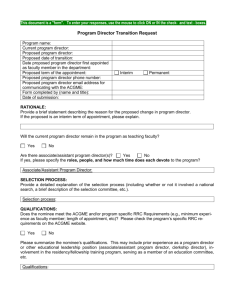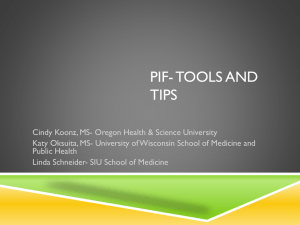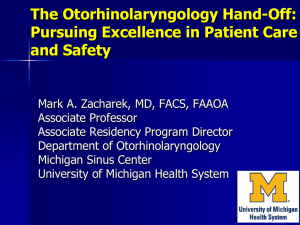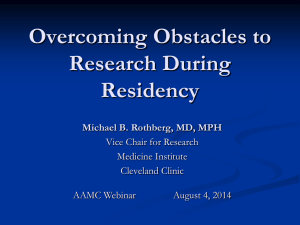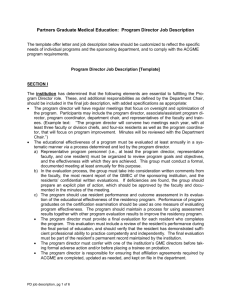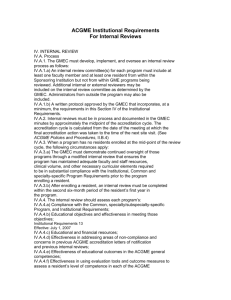The ACGME`s Role in Promoting an Effective Learning Environment
advertisement
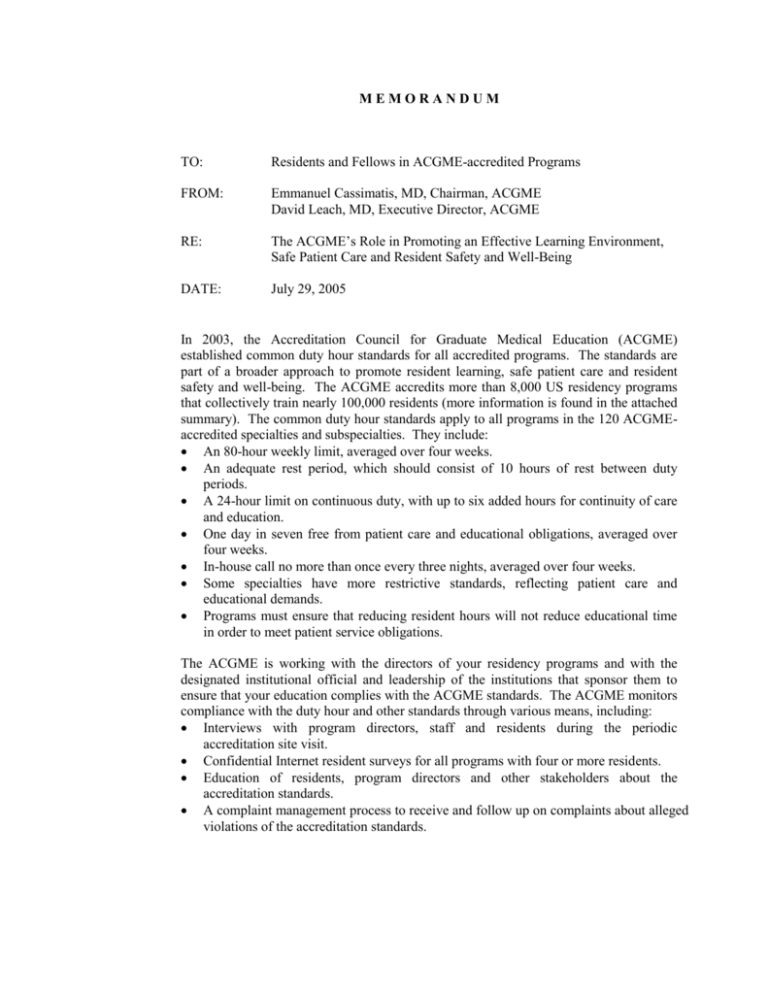
MEMORANDUM TO: Residents and Fellows in ACGME-accredited Programs FROM: Emmanuel Cassimatis, MD, Chairman, ACGME David Leach, MD, Executive Director, ACGME RE: The ACGME’s Role in Promoting an Effective Learning Environment, Safe Patient Care and Resident Safety and Well-Being DATE: July 29, 2005 In 2003, the Accreditation Council for Graduate Medical Education (ACGME) established common duty hour standards for all accredited programs. The standards are part of a broader approach to promote resident learning, safe patient care and resident safety and well-being. The ACGME accredits more than 8,000 US residency programs that collectively train nearly 100,000 residents (more information is found in the attached summary). The common duty hour standards apply to all programs in the 120 ACGMEaccredited specialties and subspecialties. They include: An 80-hour weekly limit, averaged over four weeks. An adequate rest period, which should consist of 10 hours of rest between duty periods. A 24-hour limit on continuous duty, with up to six added hours for continuity of care and education. One day in seven free from patient care and educational obligations, averaged over four weeks. In-house call no more than once every three nights, averaged over four weeks. Some specialties have more restrictive standards, reflecting patient care and educational demands. Programs must ensure that reducing resident hours will not reduce educational time in order to meet patient service obligations. The ACGME is working with the directors of your residency programs and with the designated institutional official and leadership of the institutions that sponsor them to ensure that your education complies with the ACGME standards. The ACGME monitors compliance with the duty hour and other standards through various means, including: Interviews with program directors, staff and residents during the periodic accreditation site visit. Confidential Internet resident surveys for all programs with four or more residents. Education of residents, program directors and other stakeholders about the accreditation standards. A complaint management process to receive and follow up on complaints about alleged violations of the accreditation standards. The ACGME’s Role in Promoting an Effective Learning Environment, Safe Patient Care and Resident Safety and Well-Being Page 2 In the past two years, the ACGME has used an expedited process for following-up instances of non-compliance with the duty hour standards. In this process, the ACGME may ask programs to re-administer the resident survey and request progress reports and actions plans from cited programs that demonstrate how they have achieved compliance with the standards. Ongoing failure to comply with the standards will result in adverse accreditation actions. The ACGME recognizes that residents play a vital role in the health care system. At the same time, the primary purpose of residency is educational, and your program and its sponsoring institution need to provide you with an environment conducive to learning. The ACGME will partner with you, programs and teaching institution to ensure consistent application and enforcement of its accreditation standards, including the standards that limit resident duty hours. The attached summary offers you a concise overview of the ACGME’s role and function. More information is available from our Web site (http://www.acgme.org). CC: Program Directors, ACGME-Accredited Programs Executive Directors Residency Review Committees Institutional Review Committee What is the ACGME? The Accreditation Council for Graduate Medical Education is a private, non-profit organization that accredits more than 8,000 residency programs in 120 specialties and subspecialties. Formed in 1981 through a consensus need in the medical community for an independent accrediting organization for residency programs, the ACGME’s mission is to improve the quality of health care in the United States by ensuring and improving the quality of graduate medical education programs. The ACGME’s member organizations – the American Board of Medical Specialties, American Hospital Association, American Medical Association, American Association of Medical Colleges and Council of Medical Specialty Societies – nominate members to the ACGME’s Board of Directors. The board also includes two resident representatives, the chair of the Council of Review Committees, three public members and a federal government representative. Accreditation is voluntary. However, residency programs must be ACGME-accredited to receive Medicare graduate medical education funds, and residents must complete an ACGME-accredited residency program to be eligible to take board certification exams. Twenty-seven residency review committees (one for each of the 26 specialties and one for transitional year programs) are responsible for reviewing programs. Each residency committee comprises 6 to 18 volunteer physicians appointed by the ACGME's member organizations and the appropriate medical specialty boards and organizations. The RRCs meet two to three times a year to review programs. They are assisted in their work by more than 100 ACGME staff members. Residency programs are visited onsite by an ACGME field staff member, on average, once every two to five years. Before a site visit, the program director fills out a program information form, or PIF, in which the program director provides information and documentation about the program. Residents also complete confidential online surveys a few weeks before the site visit. After the ACGME field representative conducts the oneday site visit, he or she writes a report on the program. The RRC makes its decision on whether to grant accreditation based on its review of the PIF and field staff report. In order to be accredited, programs must substantially comply with the ACGME’s common program requirements and the specialty-specific requirements. Programs in good standing receive full accreditation, while those with deficiencies that must be corrected are put on probationary accreditation. If a program fails to correct its deficiencies, accreditation can be withdrawn. In that case, the program must shut down. In most instances, the sponsoring institution may reapply for a new program in that specialty, but this new program must comply with all accreditation standards in that specialty. For more information about the ACGME, visit our Web site at http://www.acgme.org.
